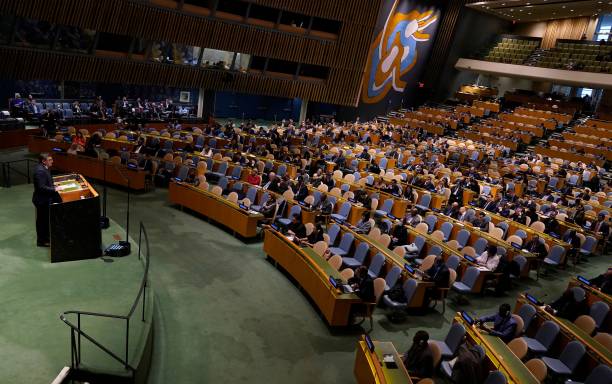Foreign policy is a term that is often used and heard in the context of international relations, but what does it mean exactly? How is it made and implemented? What are its types and features? Why is it important and relevant for our lives and the future of humanity? In this blog, we will answer these questions and more, and provide you with a brief and clear overview of the concept and practice of foreign policy.
Meaning & Definitions- What is Foreign Policy?
Foreign policy is the set of goals, strategies, and actions that a state or a non-state actor pursues in its relations with other actors in the international system. Foreign policy reflects the interests, values, and preferences of the actor, and it guides its decisions and behaviors in the global arena. Foreign trade policy is a subtype of foreign policy that focuses on the regulation and promotion of the exchange of goods and services between the actor and other actors in the international system.
History of Foreign Policy
Foreign policy has a long and rich history, and it has evolved and changed over time, along with the development and transformation of the international system and the actors in it. The history of foreign policy can be traced back to the ancient times, when the first civilizations and empires emerged and interacted with each other, and when the first forms of foreign policy, such as alliances, treaties, and wars, were practiced.
Foreign policy also developed and diversified in the medieval and modern times, when the rise and fall of various states and empires, the emergence and spread of various religions and ideologies, and the discovery and colonization of various regions and continents, shaped and reshaped the international system and the actors in it.
The making of foreign policy has always involved careful consideration and calculation, as states and other actors seek to advance their interests and protect their security in a constantly changing environment. Principles of foreign policy, such as national sovereignty, non-interference, and self-defense, have also played a significant role in shaping the conduct of international relations.
Types of Foreign Policy
Foreign policy is not monolithic or homogeneous, but rather diverse and complex, and it can be classified and analyzed in different ways. One common way is to divide it into two broad categories: hard and soft.
Hard foreign policy involves the use of force or threat of force, such as military intervention, economic sanctions, and nuclear deterrence, to achieve the goals and interests of the actor, and to coerce or compel other actors to comply or concede.
Soft foreign policy involves the use of attraction or persuasion, such as cultural exchange, humanitarian aid, and public diplomacy, to achieve the goals and interests of the actor, and to influence or convince other actors to cooperate or collaborate.
Features of Foreign Policy
Foreign policy has some distinctive features that make it different from other types of policies and practices. Some of these features are: –
Dynamic: Foreign policy is not static or fixed, but rather dynamic and flexible, and it can change and adapt to the changing circumstances and conditions in the international system and the actor’s environment.
Complex: Foreign policy is not simple or straightforward, but rather complex and multifaceted, and it involves various actors, issues, and factors that interact and influence each other in the global arena.
Interdependent: Foreign policy is not isolated or independent, but rather interdependent and interconnected, and it affects and is affected by the foreign policies of other actors in the international system.
Determinants of Foreign Policy
These are the various factors that influence the foreign policy choices of any state, such as geographical location, population, history, economic resources, ideology, efficiency of government, quality of diplomacy, crisis and immediate events, technological advancements, international law and institutions, etc. Determinants of Indian foreign policy on the other hand, are the various factors that influence India’s foreign policy choices, such as geography, economy, polity, domestic environment, military capability, leadership, international environment, etc.
Factors Affecting Foreign Policy
These are the various elements that affect the formulation and implementation of foreign policy, such as the national interests and values of the state, the domestic politics and public opinion, the policies and behavior of other states, the international system and power structure, the role and influence of international organizations and non-state actors, etc.
Objectives of foreign policy
These are the goals and priorities that a state seeks to achieve through its interactions with other states and international actors. The objectives of foreign policy can vary depending on the particular interests and aspirations of the state.Objectives of foreign trade policy on the other hand are the specific goals and targets that a state sets for its foreign trade activities, such as exports, imports, and investments.
Importance of Foreign Policy
Foreign policy is important and relevant for our lives and the future of humanity, as it affects and is affected by the various issues and topics that we face and deal with in the global arena, such as security, trade, human rights, development, and environmental protection. Foreign policy also enables and facilitates the communication and cooperation between actors in the international system, and helps to prevent and resolve the conflicts and disputes that arise among them. Foreign policy also shapes and influences the world order and the global governance that we live in and aspire for.
India’s Foreign Policy & its Features
India’s foreign policy is the reflection and expression of its interests, values, and aspirations, and it guides its relations and interactions with other actors in the global arena. India’s foreign policy has some distinctive features that make it unique and remarkable. Some of these features are:
– Non-alignment: India’s foreign policy is based on the principle of non-alignment, meaning that India does not align itself with any major power bloc or alliance, and that it maintains its autonomy and independence in its foreign policy decisions and actions.
– Peaceful coexistence: India’s foreign policy is based on the principle of peaceful coexistence, meaning that India respects and supports the sovereignty and territorial integrity of other actors, and that it seeks to establish and maintain friendly and cordial relations with them.
– Panchsheel: India’s foreign policy is based on the principle of Panchsheel, meaning that India follows the five principles of mutual respect, mutual non-interference, mutual non-aggression, mutual benefit, and peaceful coexistence in its relations with other actors, especially with its neighbors.
Conclusion
In conclusion, foreign policy is a vital aspect of international relations that affects the interests, values, and aspirations of states and non-state actors in the global arena. It is a complex and dynamic field that involves various actors, issues, and factors that interact and influence each other. Understanding foreign policy is essential to comprehending the interactions and relationships between states and non-state actors and to addressing the challenges and opportunities that arise in the globalized world.




